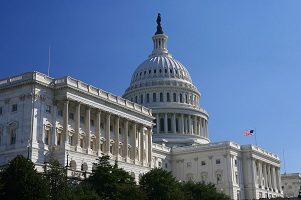Legislation that would prohibit federal law enforcement and other agencies from using facial recognition technology has been introduced in the US Congress. The bicameral legislation, dubbed as the “Facial Recognition and Biometric Moratorium Act,” would also strip funding for state and local entities, including law enforcement, that fail to enact their own such moratoriums. Aside from facial recognition, the legislation, which mirrors similar bills put forth last year, would also forbid the use of other biometric security solutions, such as gait and voice recognition.
Additionally, the act would:
• Prohibit the use of federal dollars for biometric surveillance systems;
• Prohibit the use of information collected via biometric technology in violation of the Act in any judicial proceedings;
• Provide a private right of action for individuals whose biometric data is used in violation of the Act and allow for enforcement by state Attorneys General;
• And, allow states and localities to enact their own laws regarding the use of facial recognition and biometric technologies.
“We do not have to forgo privacy and justice for safety,” Sen. Ed Markey (D-Mass.) said in a statement. “This legislation is about rooting out systemic racism and stopping invasive technologies from becoming irreversibly embedded in our society. We simply cannot ignore the technologies that perpetuate injustice, and that means that law enforcement should not be using facial recognition tools today. I urge my colleagues in Congress to join this effort and pass this important legislation.”
The bill is being sponsored by Markey along with Sens. Jeff Merkley (D-Ore.), Bernie Sanders (I-Vt.), Elizabeth Warren (D-Mass.) and Ron Wyden (D-Ore.) in the Senate and by Reps. Pramila Jayapal (D-Wash.), Ayanna Pressley (D-Mass.) and Rashida Tlaib (D-Mich.) in the House.
The Security Industry Association (SIA) came out in opposition of the legislation recently, noting that the law would threaten many of the legitimate, documented benefits of facial recognition technologies used by law enforcement, including:
• Identifying individuals who stormed the U.S. Capitol on Jan. 6;
• Reuniting victims of human trafficking with their families and loved ones;
• Detecting use of fraudulent documentation by non-citizens at airports of entry;
• Aiding counterterrorism investigations in critical situations;
• And, exonerating innocent individuals accused of crimes.
“Rather than impose sweeping moratoriums, SIA encourages Congress to propose balanced legislation that promulgates reasonable safeguards to ensure that facial recognition technology is used ethically, responsibly and under appropriate oversight and that the United States remains the global leader in driving innovation,” SIA CEO Don Erickson said in a statement.
In May, SIA joined the U.S. Chamber of Commerce and a group of other associations in sending a letter to President Joe Biden expressing concern with blanket moratoriums on facial recognition and advocating for a combination of technological safeguards and policy measures to effectively mitigate any risks associated with the technology and ensure that it is developed and used responsibly.
Several cities across the country, including San Francisco, Oakland, Boston, and Portland, have enacted their own facial recognition bans in recent years. Portland and, most recently, Baltimore, have even moved to prohibit private use of the technology.








